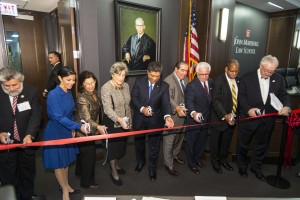
Ready to officially dedicate the 100-seat Arthur J. Goldberg Memorial Courtroom at The John Marshall Law School on Sept. 28, 2012, are (from left) Associate Dean Ralph Ruebner; John Marshall Law School Board of Trustees members Judge Celia Gamrath of the Circuit Court of Cook County, Mary Ann Hynes, and Chief Judge Timothy Evans of the Circuit Court of Cook County; United States Supreme Court Justice Antonin Scalia; Leonard Amari, president of the John Marshall Board of Trustees; Associate Dean Rory Smith and Dean John E. Corkery.
A two-day celebration at The John Marshall Law School Sept. 27 and 28, 2012, marked the official dedication of the Justice Arthur J. Goldberg Memorial Courtroom and the 30th anniversary celebration of the Center for Information Technology and Privacy Law.
United States Supreme Court Justice Antonin Scalia helped dedicate the courtroom joined by Goldberg family members, faculty, and members of the John Marshall Board of Trustees. The justice later gave an address as part of a convocation that concluded the two-day program.
Professor David Sorkin chaired the 20th Belle R. and Joseph H. Braun Memorial Symposium “The Development of Privacy Law from Brandeis to Today” with four panels discussing “The Legacy of Justice Arthur Goldberg,” “Historical Perspectives on Privacy in American Law,” “Privacy Regulation and Policy Perspectives” and “Technology and the Future of Privacy.”
The symposium in many ways honored Professor Emeritus George Trubow who helped found the Center and believed that new technologies would invade on one’s personal privacy. Professor Leslie Reis, director of the Center, said “his foresight was that privacy would be a driving force in law, business and policy.” She noted that because technologies are changing so rapidly, the law is reacting to privacy issues, much as Trubow had predicted.
The symposium opened with an address by Professor Amatai Etzioni of George Washington University, who examined the needs of one’s personal privacy versus the needs of the common good.
The courtroom dedication brought Goldberg’s daughter, Barbara Cramer, and grandsons Matthew and Dan Cramer, to campus where they were joined by Scalia for the ceremonies and ribbon-cutting.
Dan Cramer issued a special thanks from the Goldberg family saying “it really means the world to us” to have the justice recognized. He called the courtroom “a living legacy.” The family helped unveil an oil painting of the justice that hangs inside the court. Goldberg was a member of the John Marshall faculty from 1938 to 1942, and later was an adjunct faculty member. “It’s no surprise that he was passionate about the law…and the study of law. He loved to teach,” Cramer added.
Scalia admitted it was a bit awkward for him to be praising a justice that he never would have sided with in Supreme Court decisions, but Scalia likened Goldberg to Justice Thurgood Marshall. Both did outstanding work before they came on the bench. Scalia recognized Marshall, who argued the Brown v. Board of Education case before the Supreme Court, as an attorney who helped usher in the Civil Rights Movement, and he said Goldberg, as attorney of the AFL-CIO, was one of the leaders of the 1950s and 1960s Labor Movement.
Scalia reminded the audience that Goldberg was the last member of the President’s Cabinet to serve on the court. He lamented that partisanship has pushed the selection of Supreme Court justices to those with long judicial records. “Saying ’he has no judicial experience’ today is used to cast doubt in appointment hearings,” Scalia said.
At the afternoon convocation ceremonies at the Standard Club, Scalia delivered an address on his approach to constitutional originalism which he described as “giv(ing) the text that meaning which it bore when it was adopted. Which is, of course, what we do for statutes and nobody thinks statutes change over time,” he argued. “For some reason, our society has come to believe that our Constitution morphs, even though it’s a legal text; (that) what it means today is not what it meant when it was originally adopted.”
At the conclusion of his remarks, Scalia was presented an honorary degree from The John Marshall Law School.
